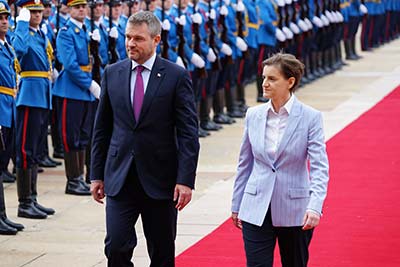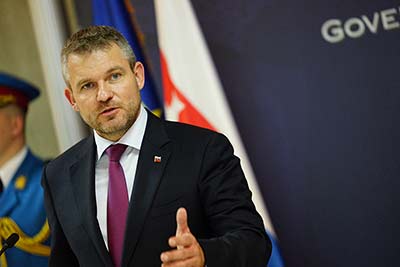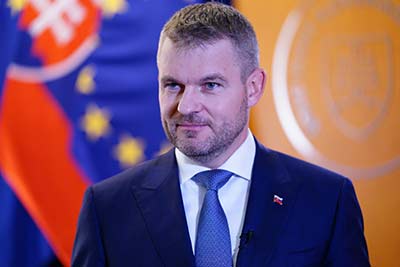Candidate countries must meet all accession criteria, while the enlargement process must be credible with respect to both the EU and candidate countries. The EU should also show empathy for the difficulties being dealt with by accession countries. It is a complex process that implies a shared vision of the future, commitments and their implementation, hard work and mutual trust – Peter Pellegrini
The recent visit to Serbia of Slovakian Prime Minister Peter Pellegrini provided an opportunity to reaffirm the two countries’ closeness in all spheres. Prime Minister Pellegrini reiterated that Slovakia remains an EU member that will advocate for enlargement and Serbia’s accession to that community. Simultaneously, as he states in this interview for CorD Magazine, membership candidate countries shouldn’t count on membership criteria being eased, nor on the bar being lowered.
Despite speculation that pressure is being exerted on Slovakia and other EU member states that haven’t recognised the unilaterally declared independence of Kosovo to align their stance with the majority in the Union, PM Pellegrini says that Bratislava continues to support Serbia’s territorial integrity.
Prime Minister Pellegrini, having recently visit Serbia, how would you assess the results of your discussions with Serbian officials?
My visit followed up on the visit of Serbian Prime Minister Brnabić to Slovakia last December. I believe that the visit strengthened the already intense bilateral relations between Slovakia and Serbia, and confirmed that both sides perceive relations as close and friendly. There are many links between Slovakia and Serbia, whether historical, interstate, interpersonal, or in the vision of intensified bilateral cooperation and a common future in a united Europe.
I am pleased that there are no open issues between our countries, and therefore we had the opportunity to discuss with PM Brnabić and President Vučić the further intensifying of our bilateral cooperation in the period ahead. I assured my partners that, as one of the closest friends of Serbia in the EU, we will continue to strive for the EU to pay due attention to the Western Balkans and assist the region in overcoming the difficulties of modernisation and integration processes. We, of course, expect Serbia to continue to fulfil its part of the engagement – bilaterally, regionally, and also at the European level.
The importance of strengthening economic cooperation was emphasised during your talks in Belgrade. What does the regulating of Serbia’s clearing debt towards Slovakia mean to relations between the two countries?
 With the Agreement on settling the debt being signed, all open issues between our countries have been resolved. The debt had its origin in the early 1990s. Although the debt was not a big issue in financial terms, I am glad that it is now closed. We plan to allocate the entire amount for the support of the Slovak national minority living abroad, especially in Serbia.
With the Agreement on settling the debt being signed, all open issues between our countries have been resolved. The debt had its origin in the early 1990s. Although the debt was not a big issue in financial terms, I am glad that it is now closed. We plan to allocate the entire amount for the support of the Slovak national minority living abroad, especially in Serbia.
When it comes to foreign trade, and especially the investment activities of Slovak companies, Serbia is the most important partner of Slovakia in the Western Balkans. Our mutual trade turnover is steadily increasing and we believe it has more potential and that there are many untapped business opportunities in industries where we believe the Slovak Republic has something to offer to Serbia, including innovation, IT solutions, energy, water management or waste management. With the Prime Minister, we signed a bilateral debt settlement agreement and opened a business forum as part of the session of the Joint Commission for Economic Cooperation.
A law according to which workers from Serbia should have the same status as domestic workers has not been adopted. In the Slovak Republic each worker legally employed in the country has labour rights that are all vested under the Slovak Labour Code
Media reported on a law recently passed in Slovakia according to which workers from Serbia have equal status as domestic workers. Why did you decide to adopt such a regulation?
Law according to which workers from Serbia should have the same status as domestic workers have not been adopted. In the Slovak Republic, each worker legally employed in the country has labour rights that are all vested under the Slovak Labour Code.
On 10th October 2018, the Government of the Slovak Republic approved the Strategy for the Labour Mobility of Foreigners in the Slovak Republic. This document, as the first of its kind, regulates the access of foreigners to the Slovak labour market in the area of labour mobility. It clearly defines specific measures of access of foreigners, and it also simplifies conditions of employment of third-country nationals for jobs that continue to experience shortfalls in the workforce on the labour market.
Statistics record outflow of labour from Serbia, but also from the whole of Eastern Europe westwards, primarily to Germany. Do you see this situation as potentially causing economic and social problems in the future?
 Primarily around the time of our accession to the EU, in 2004, we can well remember the outflow of Slovaks to Western Europe. However, we hope that this trend has been changing now. In the last two years, the Slovak Republic has fortunately experienced a positive migration balance, mainly due to incoming foreign workers from other EU countries. In comparison with our neighbouring countries, the percentage of foreign workers is still much lower. However, it has risen rapidly in recent decades and has also become one of the main drivers of positive net migration.
Primarily around the time of our accession to the EU, in 2004, we can well remember the outflow of Slovaks to Western Europe. However, we hope that this trend has been changing now. In the last two years, the Slovak Republic has fortunately experienced a positive migration balance, mainly due to incoming foreign workers from other EU countries. In comparison with our neighbouring countries, the percentage of foreign workers is still much lower. However, it has risen rapidly in recent decades and has also become one of the main drivers of positive net migration.
Incoming foreign workers arrive in regions with labour shortages, and they are also relatively young. This has a positive effect on public finances. A particularly high-skilled and well-educated labour force is the backbone of any modern economy. I, therefore, believe that our economic development will also lead to many Slovaks who study or work abroad returning to their home country.
On the one hand, I must say that we’ve recorded a decrease in the number of Serbian citizens working in Slovakia since the end of last year. In May 2019 we recorded approximately 13,000 workers from Serbia, while in September 2018 we recorded approximately 15,000 workers. We also have a growing number of citizens from Ukraine. The total number of foreigners working in Slovakia, thus, is experiencing a growth trend.
One aspect of our countries’ excellent bilateral relations is Slovakia’s support for Serbia’s territorial integrity. At the same time, it is reported regularly in the media that many other EU member states and international partners are calling on you to recognise Kosovo’s independence. Why do you persist in your decision not to do so?
Our position regarding the unilateral declaration of independence of Kosovo remains the same – we support Serbia’s territorial integrity and have no reason to change that stance. I think that other countries respect our position and I don’t feel significant pressure from our partners to change our position. During my Belgrade visit, I confirmed that the position of the Slovak Republic regarding Kosovo’s unilateral declaration of independence remains unchanged.
The introduction of import duties was a very nonstandard step by Pristina. We absolutely agree with the assessment that this measure is contrary to the rules of the CEFTA agreement and that it breaches mutual trust, as its only goal is to gain political points domestically
How would you assess the recent appearance of both Aleksandar Vučić and Hashim Thaçi at the GLOBSEC forum in Bratislava?
I am pleased that the Globsec Forum has become one of the most prominent events of its kind in Europe. It provides a vibrant platform for the exchange of views and ideas, not only on security-related topics, as it was in past, but nowadays also on a wide range of international issues and their projections for the future. The forum attracts policymakers, experts and influential people from both Europe and other continents. Although I didn’t follow the discussions of Messrs Vučić and Thaçi, I believe that they found the Forum and the respective meetings they had in Bratislava useful and that their discussion contributed to the quality of this year´s GLOBSEC.
You stated during your recent visit to Belgrade that the introduction of trade tariffs on goods from central Serbia represents a serious violation by the Kosovo government. In your opinion, why has there been no adequate response to this move from the EU and international factors?
 The EU and the U.S. have exerted pressure on Priština, though unfortunately without results. I do not want to speculate why the reaction of the EU, or at the international level, was not even stronger. It is true that the EU has been quite busy with Brexit, internal reforms, or consideration of a new financial perspective and the composition of new European Parliament and the European Commission, but that shouldn’t be an excuse. The introduction of import duties was a very non-standard step by Pristina. We absolutely agree with the assessment that this measure is contrary to the rules of the CEFTA agreement and that it breaches mutual trust, as its only goal is to gain political points domestically. I am wondering why Prtiština wants to join international organisations, such as CEFTA, when it does not fulfil its obligations.
The EU and the U.S. have exerted pressure on Priština, though unfortunately without results. I do not want to speculate why the reaction of the EU, or at the international level, was not even stronger. It is true that the EU has been quite busy with Brexit, internal reforms, or consideration of a new financial perspective and the composition of new European Parliament and the European Commission, but that shouldn’t be an excuse. The introduction of import duties was a very non-standard step by Pristina. We absolutely agree with the assessment that this measure is contrary to the rules of the CEFTA agreement and that it breaches mutual trust, as its only goal is to gain political points domestically. I am wondering why Prtiština wants to join international organisations, such as CEFTA, when it does not fulfil its obligations.
The media reported on a letter sent jointly by 13 EU member states seeking that the EU not abandon the policy of enlargement to encompass the Western Balkans. What are the key arguments advocating in favour of EU enlargement today, considering developments within the EU itself?
We believe that EU enlargement represents a strategic investment in peace, democracy, prosperity, security and stability in Europe. It also has its own transformative power, because future members have to implement EU standards and values. These are not empty words, because without standards and values our economy would not function. So, strategic issues require strategic thinking and strategic actions.
On the one hand, no shortcuts or lowering of the bar is acceptable, and candidate countries must meet accession criteria. On the other hand, the enlargement process must be credible with respect to both the EU and the candidate countries. The EU should also show empathy for the difficulties being dealt with by accession countries.
It is a complex process that implies a shared vision of the future, commitments and their implementation, hard work and mutual trust.
Slovaks have been living in Serbia for over 250 years, and thus belong to the most deeply-established ethnic communities in this country. It goes without saying that we pay special attention to their status in our bilateral contacts with Serbian representatives
Given that relations between Slovakia and Serbia are rated as excellent, does that mean that you’re satisfied with the Serbian government’s relations with the Slovak minority in Serbia?
As you rightly point out, political, economic and trade relations between our countries are indeed excellent. Slovaks have been living in Serbia for over 250 years, and thus belong to the most deeply-established ethnic communities in this country. It goes without saying that we pay special attention to their status in our bilateral contacts with Serbian representatives.
We appreciate the active involvement of the Serbian government in solving everyday issues, but also long-term challenges that our Slovak minority may encounter, including education, minority media, or representation in local government structures. We believe that special priority should also be given to other important issues, such as the employment of younger generations, professional development, wage growth, as well as effective education.
At the end of the day, our primary goal is to achieve a situation in which Serbia is perceived by the members of the Slovak community as a country where they see not only their own future but also the future of their families.
In other words, we have to try to do everything we can in order to stop, or at least reduce, the number of people leaving the country never to return. I think that the Government of Serbia is working towards the same goal.
| MINORITY
We plan to allocate the entire amount for the support of the Slovak national minority living abroad, especially in Serbia |
SUPPORT
Our position regarding the unilateral declaration of independence of Kosovo remains the same – we support Serbia’s territorial integrity and have no reason to change that stance |
EMPATHY
The EU should also show empathy for the difficulties being dealt with by accession countries |
|---|